The Economics and Statistics Division maintains archives of previous publications for accountability purposes, but makes no updates to keep these documents current with the latest data revisions from Statistics Canada. As a result, information in older documents may not be accurate. Please exercise caution when referring to older documents. For the latest information and historical data, please contact the individual listed to the right.
<--- Return to Archive
For additional information relating to this article, please contact:
July 30, 2019EARLY LEARNING AND CHILD CARE FOR CHILDREN AGED 0 TO 5 YEARS: PROVINCES Statistics Canada has released data from the Survey of Early Learning and Child Care Arrangements (SELCCA) that provides a snapshot of early child care usage. The survey was conducted in early 2019 among households with children aged 0 to 5 years of age, excluding children living in institutions or on reserve. Early learning and child care arrangements include any form of child care, formal or informal, by someone other than their parent or guardian, but the survey excluded occasional babysitting and kindergarten.
The participation of children (aged 0 to 5 years) in early learning and child care varied at the provincial level with higher rates in Quebec and Prince Edward Island than the other provinces. In Nova Scotia, 61 per cent or 31,198 children were in child care. Nationally, 59.9 per cent of children are in child care.
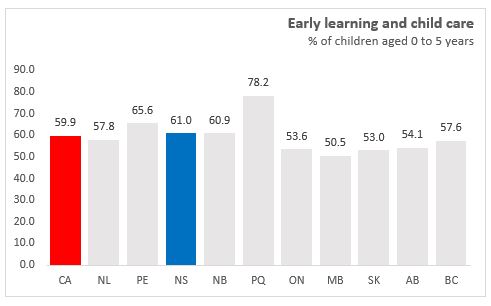
The most common types of child care arrangement in all provinces was in formal daycare, preschool or childcare centers. Care by relative was the second most common type of child care in all provinces except Quebec, where family child care homes accounted for a larger share. Nova Scotia child care types were similar to national types with daycare/preschool (55.4%), care by relative (27.2%), family child care home (21.4%), before/after school programs (8.2%) accounting for majority of arrangements. Smaller shares of children are cared by non-relative in the child’s home (6.4%) and other arrangements (3.3%) in Nova Scotia and the other provinces.
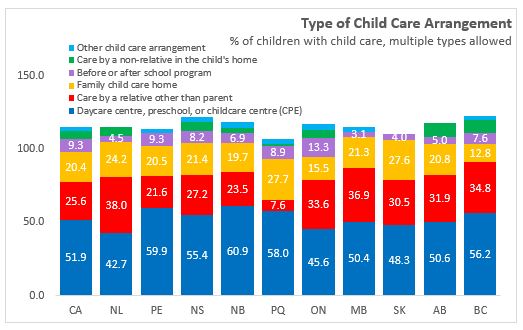
The reasons for selecting a child care arrangement were similar across the provinces. Location and characteristics of individual care provider were the most common response with at least 50 per cent including these as reasons for using their main child care arrangement. Affordability reasons for selecting child care was higher in Alberta and Newfoundland and Labrador and lower in Prince Edward Island and New Brunswick. Manitoba respondents identify a higher percentage (30.4%) as selecting a particular child care arrangement due to it being the only option available.
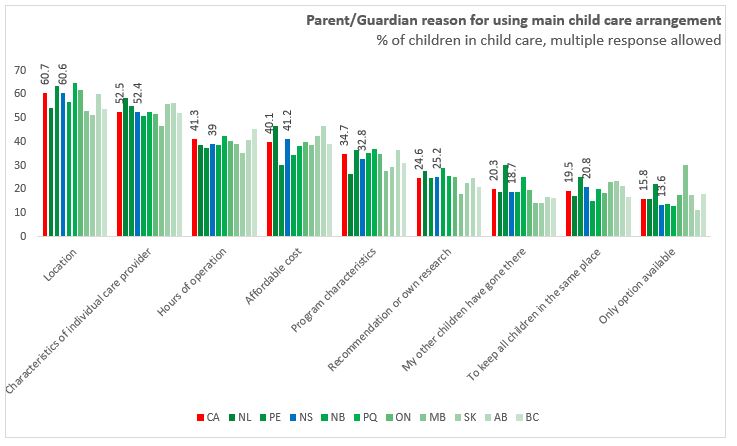
Among the respondents that have found child care arrangements in Nova Scotia, 64.3 per cent reported no difficulty in finding child care and 35.7 per cent had difficulty in finding child care. Having no difficulty in finding child care ranged from low of 48.1 per cent in Manitoba to high of 69.5 per cent in Quebec.
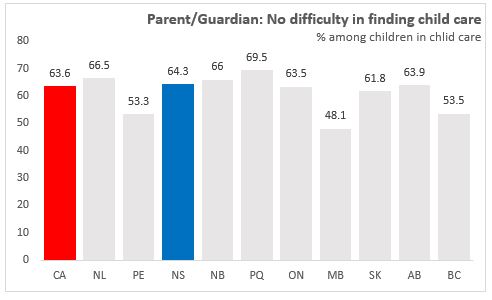
In most provinces, the most common difficulties in finding child care were related to it being available in the respondents community, affordability, and fitting work/study schedules. Difficulties related to finding sufficient quality, license and qualified providers, and accommodating multiple children were less common. Nova Scotia respondents noted higher difficulty in finding child care within community and fitting work/study schedule but fewer difficulties in the other categories compared to the national respondents.
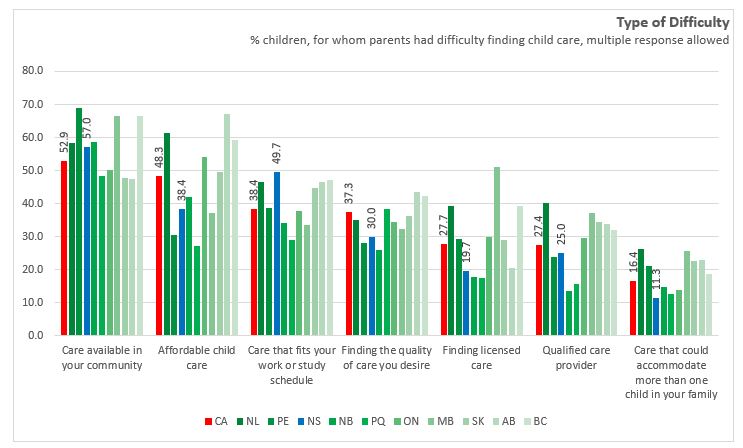
In Nova Scotia, the most common consequences related to difficulty in finding child care were changing work schedules, working fewer hours and using multiple/temporary arrangements with each category having at least 40 per cent of respondents citing it. Among those with difficulties, 20 per cent in both Nova Scotia and nationally reported "none of the above" in terms of their consequences, suggesting that most did have at least one consequence.
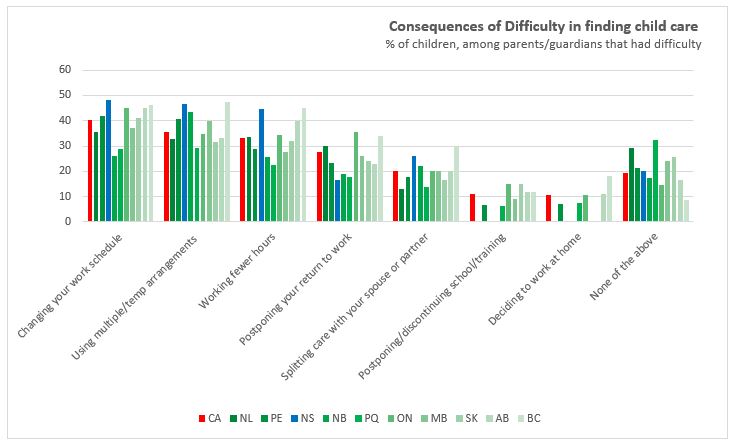
At the national level, the most common reasons for not using child care are related to a parents deciding to stay home and maternity/paternal leave followed by high costs. In Nova Scotia, high costs were reported by 28.8 per cent of those not using child care as a reason.

Note: Data for certain categories for some provinces is suppressed by Statistics Canada and does not show up in charts. The differences in provincial results may not be statistically significant.
Source: Study: Early learning and child care for children aged 0 to 5 years: A provincial and territorial portrait
Statistics Canada Tables: 42-10-0004-01 to 42-10-0010-01
<--- Return to Archive